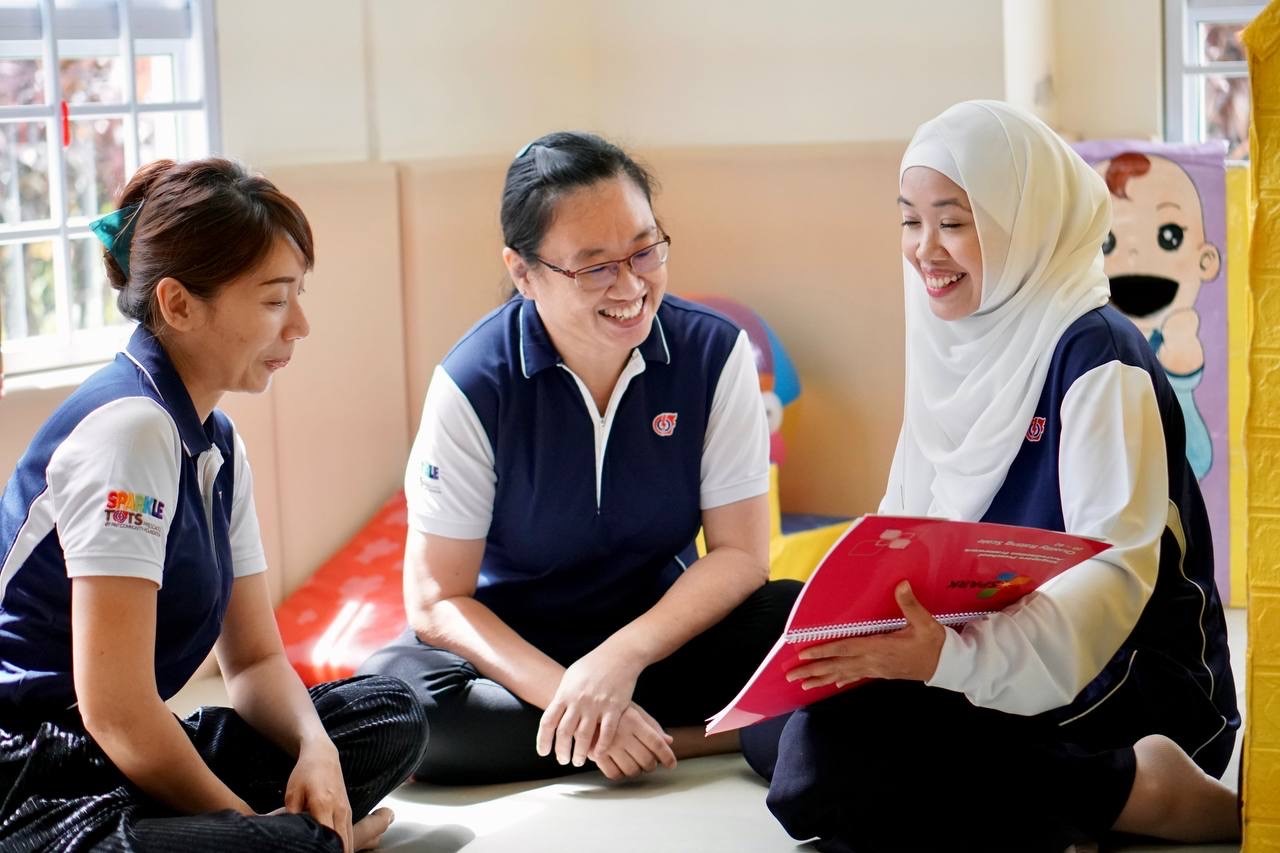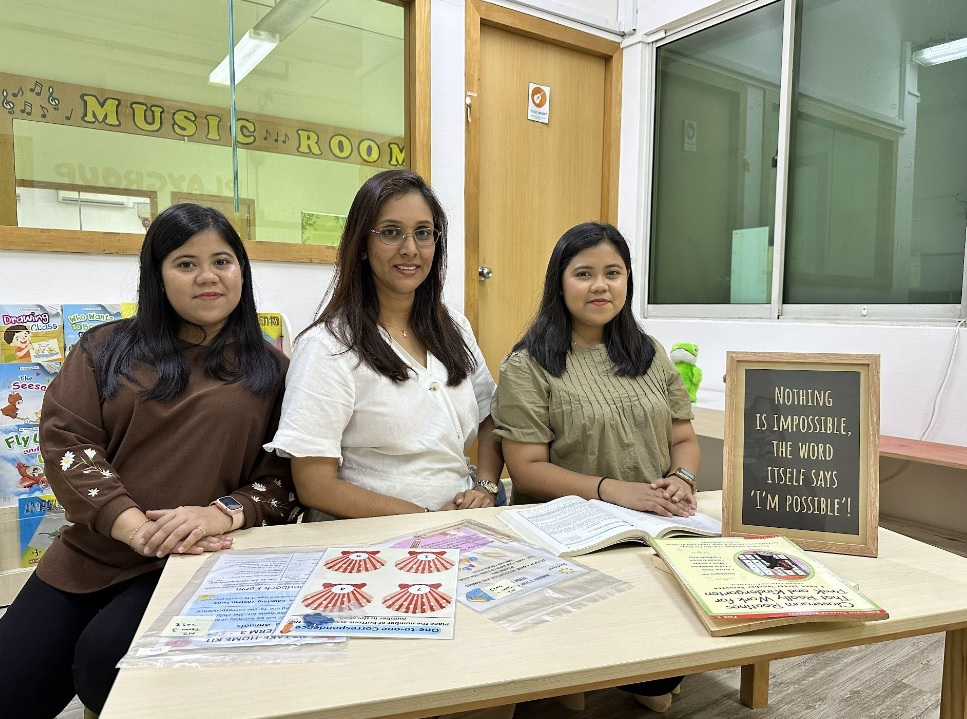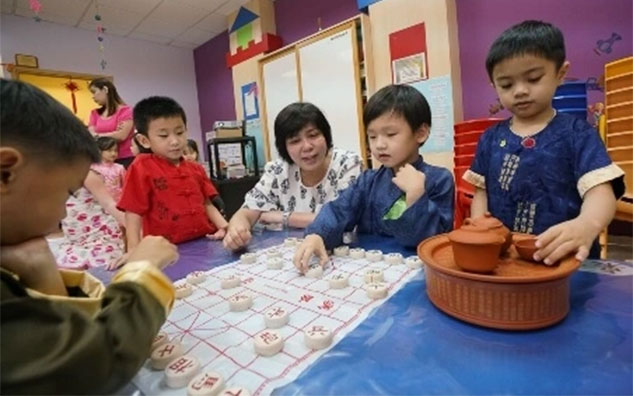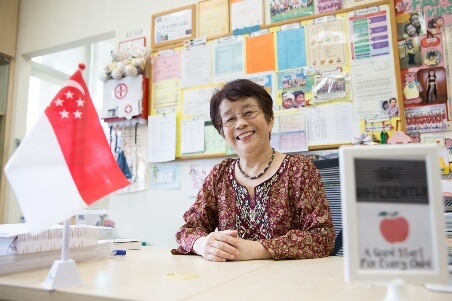Coding the Future: Integrating Technology Literacy and the Outdoors

We live in a digital age. Beyond reading, writing and mathematics, technological literacy is a foundational life skill for all learners. More preschools are integrating digital literacy into their curriculums today, in fun and engaging ways.
The unique technology-supported Nature programme is a staple of Skool4Kidz Campuses, including their Campus @ Yishun. According to Vice Principal, Ms Chan, this focus on technology – particularly in coding – is aligned with Skool4Kidz Preschools’ emphasis to prepare young children to be future-ready.
“We prepare our children for the future by equipping them with the relevant 21st century citizenry knowledge and skills,” shared Ms Chan.
To this end, Skool4Kidz Campus @ Yishun conducts numerous unplugged and plugged coding activities as part of their curriculum three times a week. They use a range of different technology toys such as Matatalab, Bee-Bot, Code-a-Pillar and Robot Mouse, as well as tablets loaded with educational applications to pique the children’s interests in various subject areas such as language and literacy.
But this learning does not always take place solely behind screens.
Skool4Kidz Campus @ Yishun has integrated its coding curriculum with outdoor play for a more holistic and balanced learning experience since 2022. “This approach extends and diversifies children’s learning by exposing them to the wonders of technology and the natural world,” explained Ms Chan.
Extend learning beyond the classroom through coding
 Children are encouraged to use Technology Robots to aid their learning during an outdoor play session
Children are encouraged to use Technology Robots to aid their learning during an outdoor play session
One of these activities is ‘Nature Hunt with Tech’, where children programme a robotic toy to collect various pictures of plants on a grid mat. The children will then head into the school garden to search for these plants. During this outdoor play session, the children are encouraged to examine the different plants by using their senses to touch, feel and smell them.
As an extension to their learning, the children can scan the QR code paired with each plant to access curated information using a tablet. “This way, new knowledge is gleaned through hands-on discovery and self-exploration,” says Lead Teacher, Ms Syafiqah. She believes that this approach not only empowers children to use technology, but also develops their love for nature and the outdoors.


Lead Teacher Ms Syafiqah introducing more plant facts to her preschoolers via a tablet
Mdm Siti Subaidah Binte Supandi, has noticed that these integrated sessions have made her four-year-old daughter, Liyana, a more independent learner. “She now has longer attention span, is more curious, receptive and willing to participate in outdoor activities,” said Mdm Siti.
To encourage parents like Mdm Siti to be a part of their child’s learning, Skool4Kidz Campus @ Yishun developed home-based coding activities that parents can engage their child in at home.
Mdm Siti enjoys such hands-on activities as it allows Liyana to practise her problem-solving skills while having fun and bonding as a family. “We exchange ideas and try out different solutions; this helps her recap what she has learnt in the preschool. Technology tools also offer new opportunities for me to build relationships and encourage more discussions with my child.”


Mdm Siti with her four-year-old daughter, Liyana
Skool4Kidz Preschools also developed their programme beyond class-based coding activities. Since 2017, it has been a participant and strong advocate for the annual Hour of Code, a global movement to introduce people of all ages to computer programming. The preschool encourages their little ones to take part in global coding competitions and are regular participants of the MatataWorld Robotics Finals Competition.

Skool4Kidz Preschoolers actively participates in the global Hour of Code annually since 2017
“By working with technology partners with similar vision and emphasis on coding such as Matatalab, we inspire and encourage each other to improve the learning outcomes of our children,” shared Ms Chan.
Enhancing learning competencies, life skills and more

Coding is a basic language that involves creating step-by-step instructions using robotic toys to solve challenges
Learning coding extends far beyond understanding the foundations of programming.
Coding is a basic language that involves creating step-by-step instructions for a computer to perform specific functions. In our world of digital devices, it is the primary language of our smartphones, games, appliances and more!
Learning coding imparts similar benefits as learning languages. It improves memory, develops critical and logical thinking, enhances listening skills, improves ability to structure ideas and sharpens concentration. Coding is also an application of math and can help children to better visualise and grasp math concepts.
Ms Syafiqah pointed out: “Through our coding activities, the children practise computational thinking and problem-solving skills. They also learn how to break down problems into manageable parts (decomposition), recognise patterns, focus on important information (abstraction) and deploy step-by-step solutioning (algorithms).”
By working in groups, the children also learn how to work cooperatively, plan as a team and verbalise their ideas to each other. “Our children are even able to guide their peers (and adults) on how the commands can be applied effectively. We noticed that they become more confident during independent and small group learning activities,” shared Ms Syafiqah. “When met with errors and difficulties, the children are encouraged to reflect on what went wrong and try different sets of commands to resolve the problem.”
The building blocks of integrating coding into preschool curriculum


So how can other preschools integrate more technology-based activities into their lessons? Ms Syafiqah has some practical tips for fellow preschool teachers:
-
Start small. Begin with activities like digital storytelling or co-creating digital books with photos obtained during outdoor play. Then introduce the robotic toys and let the children familiarise themselves with them before assigning tasks.
-
Deploy technology to enhance, not replace, learning. Content learning should be the focus of each coding outcome. Effectiveness should be based on the children’s mastery of content rather than their mastery of technology.
-
Prioritise communicating learning objectives. Help children focus on the learning goals by explaining clearly why certain technologies are selected for the activity.
-
Connect with real life experiences. Hone children’s language and interpersonal communication skills by encouraging them to verbalise what they see and do. This helps them connect what is on screen with real-life experiences.
Preschool teachers should also invest time to familiarise themselves with the technology tools available and prepare a back-up plan in case of IT glitches during lessons. In fact, unplugged coding sessions have just as much value – and can also be adapted for home-based learning, which drives continued learning, supports greater parental participation and home-centre partnerships.
To equip preschool teachers on the use of educational coding equipment, Skool4Kidz Preschools conduct curriculum training regularly and even has a Technology Champion in each centre to imbue technology empowerment in children’s learning. They share ideas, best practices and collaborate in coding initiatives across centres.
An important advice for preschool teachers - Ms Chan shared that starting any new initiative is always challenging. “However, it gives us a great sense of fulfilment and joy when we can benefit children’s learning. Press on to develop the preschoolers’ love for learning in 21st century competencies!”
Be inspired by more stories and innovative practices from other preschools here.





